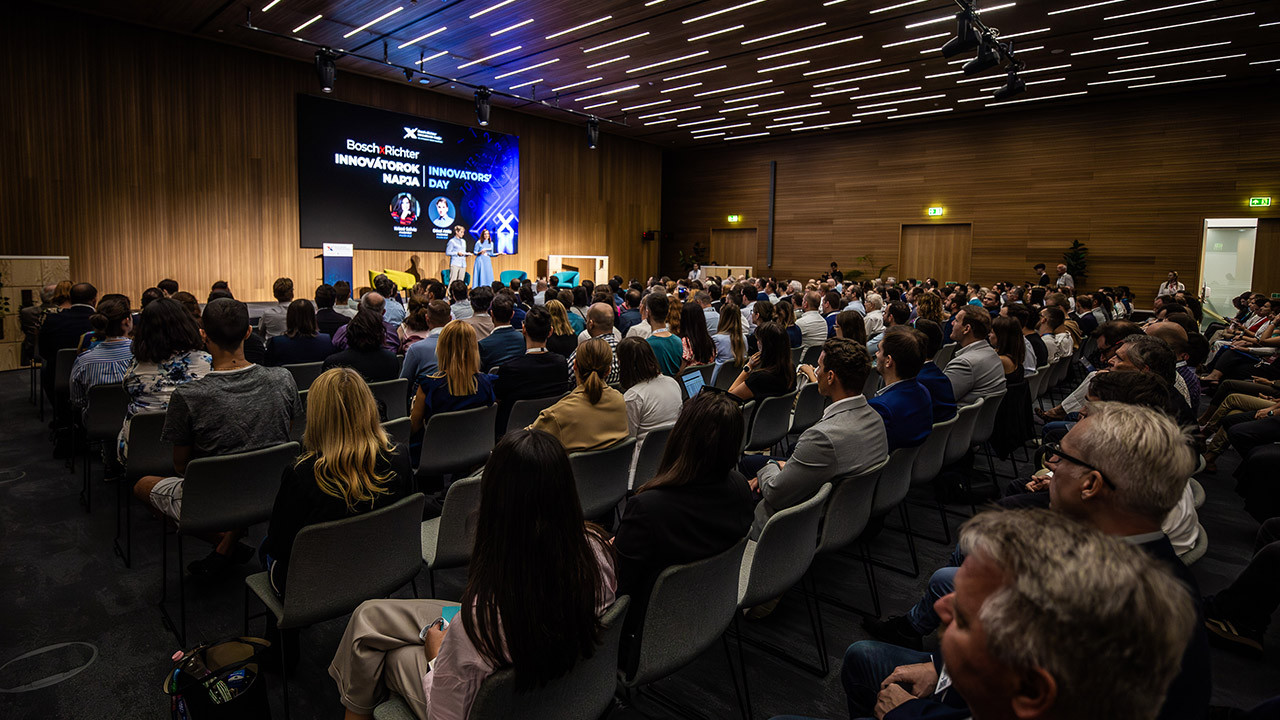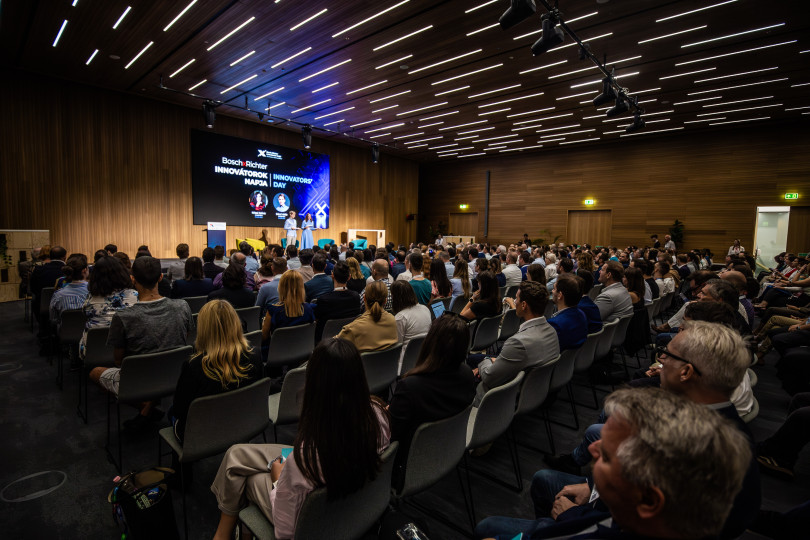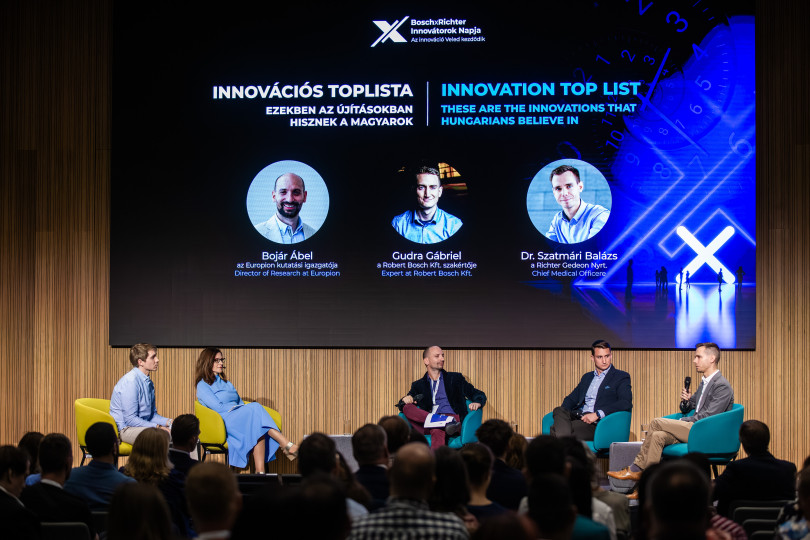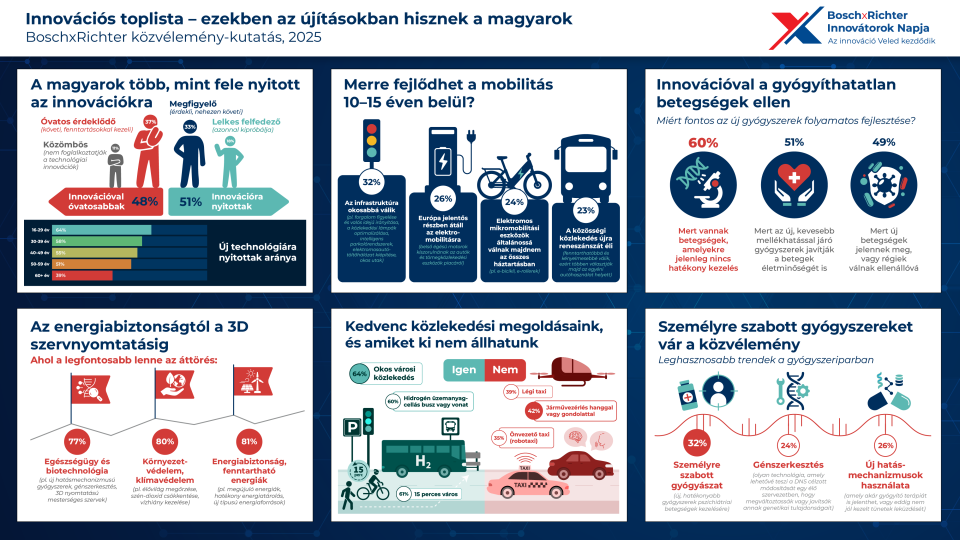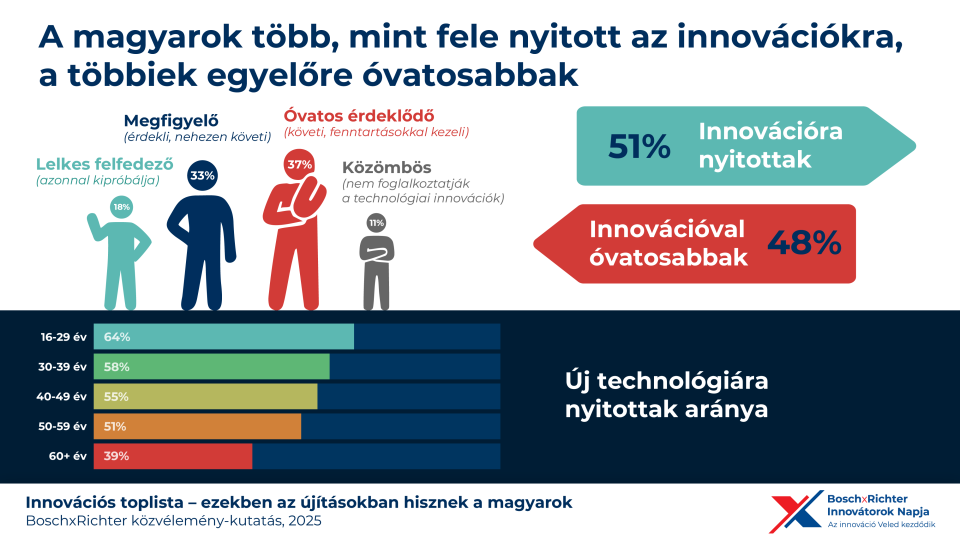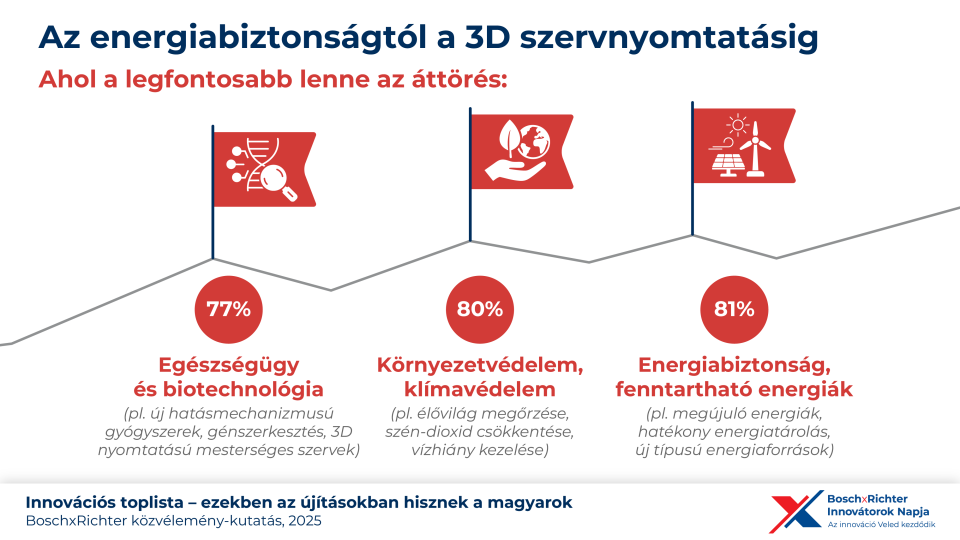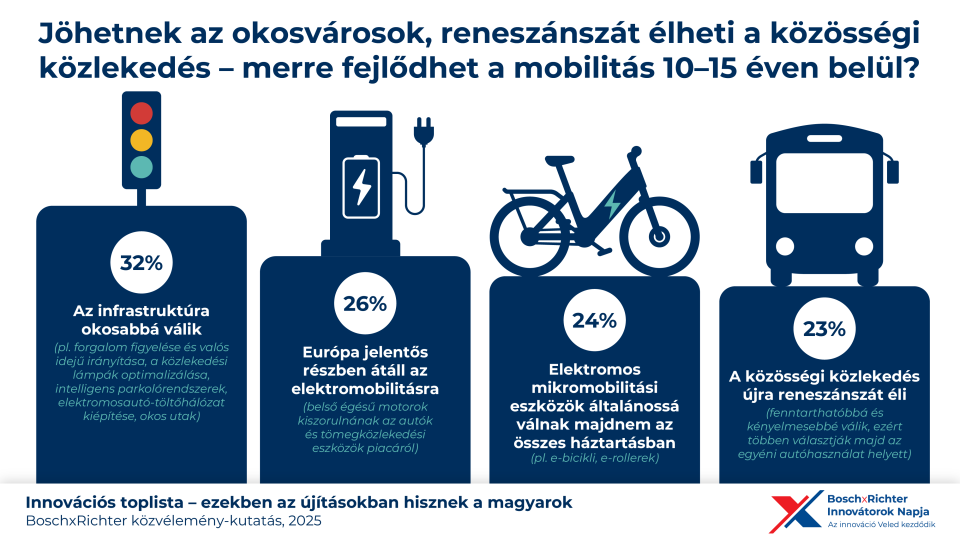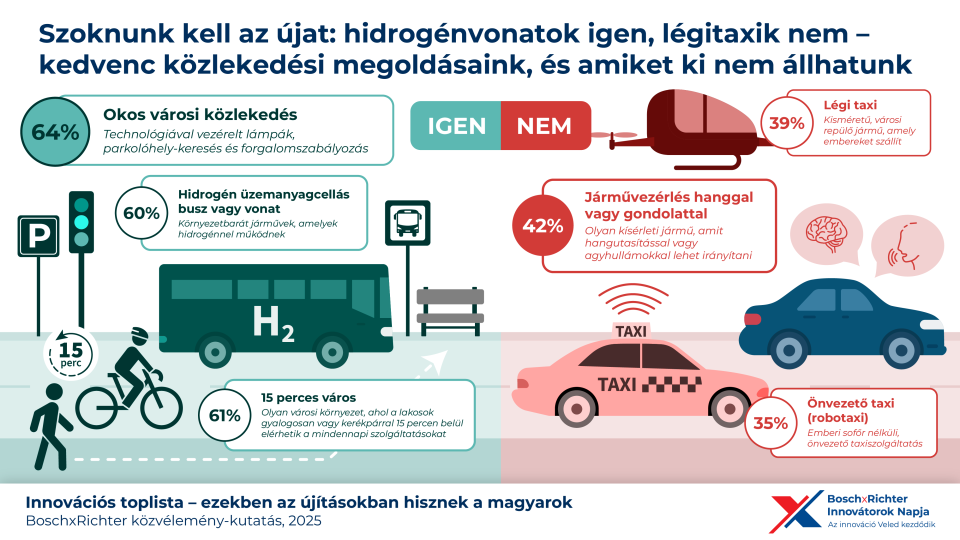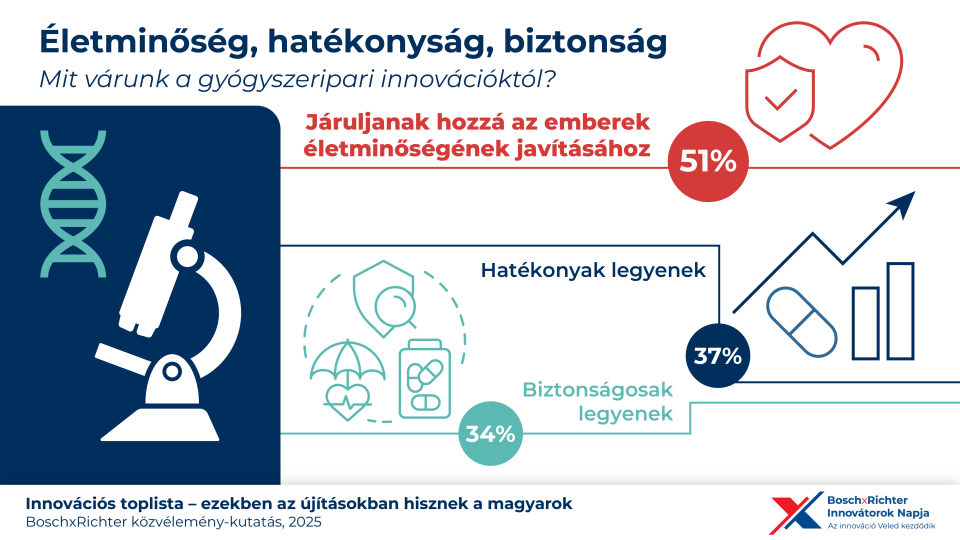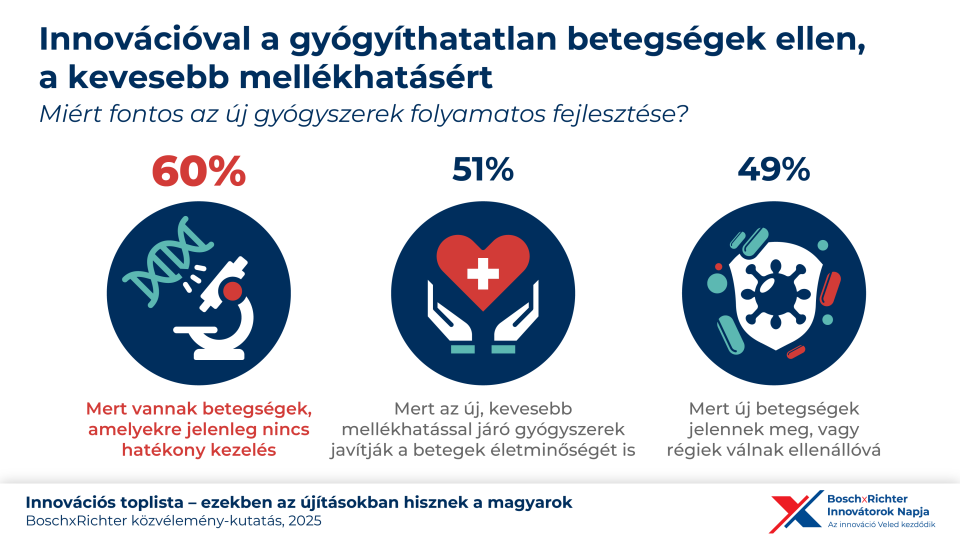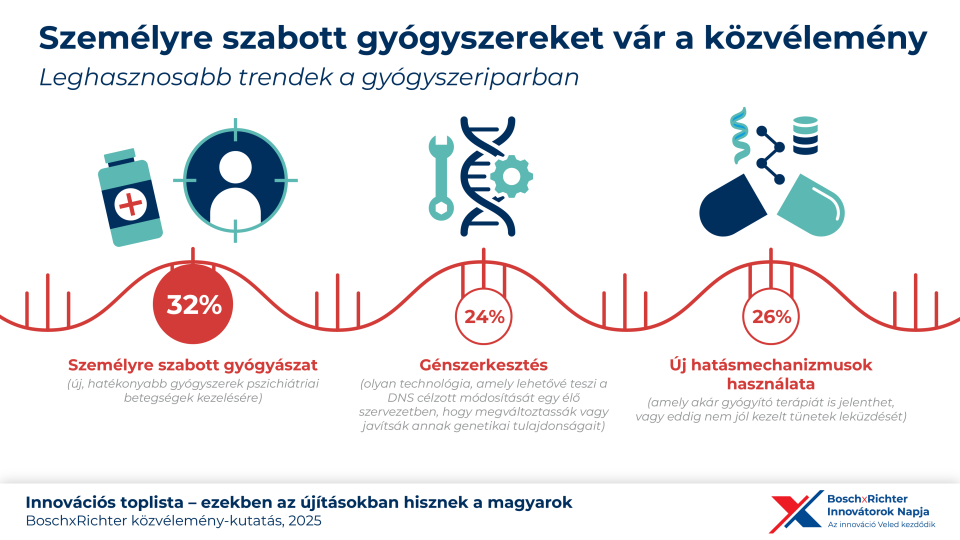Budapest – Public opinion in Hungary is divided when it comes to technological trends: although there are reservations, the majority expects innovations, particularly technological and scientific developments, to improve quality of life in the long term.
What innovative solutions would Hungarians welcome? Do they trust mRNA technology or 3D-printable organs? Would they travel by air taxi or hydrogen train? In their research, entitled “Innovation Top List: These Are The Innovations Hungarians Believe In,” the Bosch Group in Hungary and Gedeon Richter Plc. are looking into the future of transportation and the pharmaceutical industry. The latest results of the research were presented together by two of Hungary’s leading companies at the Bosch×Richter Innovators’ Day conference on September 23, 2025, at the Bosch Budapest Innovation Campus.
Far away and yet so close – more than half of Hungarians are open to innovation, while others remain cautious for now
Whether it's transportation, sustainability, healthcare, or the challenges of urban life, many believe that innovative technologies can bring about positive change. In Hungary, slightly more people feel close to technological innovations (51%), than those who feel distanced from them (48%). Openness to innovation varies significantly by age, education, and even income levels. For example, receptiveness to new technologies is more than one and a half times higher among 16 to 29-year-olds (64%) than among people over 60 (39%).
From energy security to 3D organ printing
While innovation trends strongly influence how we view the latest technologies, the reverse is also true: public opinion itself often seeks to shape which future developments should matter most. According to the joint research by Bosch×Richter, respondents expect the biggest technological breakthroughs in the next 10–15 years to come from artificial intelligence (59%), security and defense (58%), and industrial automation (53%). Yet, most people would consider advancements in other areas even more significant. More than three-quarters of participants would like to see major progress in fields such as sustainable energy (81%), climate protection (80%), and healthcare and biotechnology (77%). Such developments could help address challenges like energy security, efficient energy storage, and new types of energy sources. They could also have a positive impact on wildlife conservation, reducing CO₂ emissions and tackling water scarcity. Besides, the expected developments may also yield results in the creation of new types of medicine, gene editing or even in the field of 3D-printed artificial organs.
The future of mobility: the automotive industry is expected to deliver the largest number of innovative solutions
Sustainability and the future of climate-conscious cities is hardly conceivable without rethinking mobility, and the systems for passenger and freight transportation. Based on the research results – despite the current uncertainties in the industry – Hungarians clearly consider automotive manufacturing as the most innovative (48%) and also the most useful (40%) mobility sector. At the same time, many also consider the development of urban micromobility (32%) and public transportation (31%) as forward-looking. Nevertheless, innovation in logistics (32%) and transportation infrastructure (30%) is also seen as necessary and valuable.
“The research data also confirms that there is a particularly high societal demand for automotive innovations. Whether it involves car manufacturing, public transportation, or the smart cities of tomorrow, developments in mobility are key to the future. At Bosch, we are continuously working on technologies that can make life better and more sustainable for current and future generations," – added Dr. István Szászi, representative of the Bosch Group in Hungary and the Adriatic Region.
In 10 years: smart cities may emerge, public transport may experience its renaissance
Nearly one-third of respondents (32%) believe that within the next 10–15 years, our infrastructure could become smarter: real-time traffic monitoring and automatic control, intelligent optimization of traffic lights, smart roads and urban parking systems that can “see” available spaces could all become a reality. One in four respondents (23–26%) goes even further than this. They believe that over the next 10–15 years, much of Europe will transition to electromobility, meaning that internal combustion engines will be pushed out of the automotive and public transportation market. Simultaneously, electric micro-mobility devices, eBikes and e-scooters will become commonplace in almost every household. Public transportation is also expected to experience a renaissance: it will become more sustainable and comfortable, encouraging more people to choose it over private car use.
Getting used to the new: hydrogen trains yes, air taxis no!
Hungarians not only see the advent of smart cities as realistic but would also gladly enjoy their benefits (64%), and many would live (61%) in “15-minute” cities, where everyday services can be reached on foot or by bicycle within a quarter of an hour. Hydrogen fuel cell buses and trains are also among the big favorites, with a majority (60%) saying they would use them on a regular basis in the future. However, there are also innovative, almost utopian possibilities that tend to provoke negative reactions among the Hungarian population: for example, around 40% of respondents reject the idea of vehicles controlled by voice commands or brain waves, or the idea of urban air taxis. In fact, one in three respondents (35%) in Hungary are opposed to the use of driverless, self-driving robotaxis, which are already operational in some parts of the world.
Innovation in the pharmaceutical industry: quality of life, efficiency, and safety
Alongside transportation, the public considers the pharmaceutical industry to be a particularly important area of technology. Innovations in this field must not only undergo complex research, development, and manufacturing processes, but also meet numerous societal needs. As a primary expectation, more than half of respondents (51%) emphasize the importance of improving people’s quality of life. However, many also highlight the effectiveness (37%) and safety (34%) of innovative medicines. Presumably due to their complexity and the specialized know-how, few expect pharmaceutical innovations to be comprehensible to them in every detail and depth: only 14% list transparency and 12% highlight comprehensibility among the main considerations.
Innovation against incurable diseases and for fewer side effects
The overwhelming majority of the public (60%) consider the development of new, innovative medicines particularly important due to currently incurable diseases. In addition, every second respondent also identifies reducing the side effects of medicines (51%) as a goal, but they also consider continuous innovation in the pharmaceutical industry necessary due to the emergence of new diseases and the resistance of old ones (49%).
“For the public, innovation is not an abstract concept, but a direct expectation. Especially when it comes to incurable diseases or the side effects of treatments. At Gedeon Richter, we are constantly working to develop therapeutic solutions based on the latest scientific findings that provide real answers to these challenges” – highlighted Gábor Orbán, CEO of Gedeon Richter Plc.
Doubts about mRNA technologies, the public opinion expects personalized medicines
Given the flood of information through online and other channels, it is not surprising that respondents today form a strong opinion not only about innovations, but also about professional methods and technologies. As far as the pharmaceutical industry is concerned, respondents here also see the rise of artificial intelligence as the strongest trend (35%), but fewer are convinced of its usefulness (23%). The research also shows that while mRNA-based technologies are perceived as one of the fastest-growing areas (29%), public trust in them is among the lowest in Hungary, with only 17% ranking them as the most useful innovations. This perception likely reflects societal debates around the COVID-19 pandemic and mandatory vaccinations. In contrast, the Hungarian public considers the development of personalized medicines (32%), therapies with new mechanisms of action (26%), and gene-editing innovations (24%) as the most promising and useful pharmaceutical trends.
Bosch×Richter Innovators’ Day – jointly for the third year
This year marks the third time that two of Hungary's leading innovative companies, the Bosch Group in Hungary and Gedeon Richter Plc., have organized a joint conference. Every year, the event shines a spotlight on current trends in the world and in research and development, while also paying tribute to the two founders, Robert Bosch and Gedeon Richter. The 2025 conference also featured the presentation of the two companies' joint research entitled “Innovation Top List: These Are The Innovations Hungarians Believe In.”
Research methodology
The research was conducted by the Europion research institute on behalf of Gedeon Richter Plc. and the Bosch Group in Hungary. Mobile and web-based data collection took place between May 16 and 19, 2025. The target population for the research consisted of Hungarian residents over the age of 16. The sample of 1,072 people was representative in terms of age, gender, educational attainment, type of settlement, and region.
Zita Hella Varga
Phone: +36 70 667-6374
Bosch has been present in Hungary since 1898 with its products. After its re-establishment as a regional trading company in 1991, Bosch has grown into one of Hungary’s largest foreign industrial employers with currently nine subsidiaries. In fiscal 2024 it had total net sales of 2058 billion forints and consolidated sales to third parties on the Hungarian market of 313 billion forints. The Bosch Group in Hungary employs more than 17,400 associates (as of December 31, 2024). In addition to its manufacturing, commercial and development business, Bosch has a network of sales and service operations that covers the entire country.
The Bosch Group is a leading global supplier of technology and services. It employs roughly 418,000 associates worldwide (as of December 31, 2024). The company generated sales of 90.3 billion euros in 2024. Its operations are divided into four business sectors: Mobility, Industrial Technology, Consumer Goods, and Energy and Building Technology. With its business activities, the company aims to use technology to help shape universal trends such as automation, electrification, digitalization, connectivity, and an orientation to sustainability. In this context, Bosch’s broad diversification across regions and industries strengthens its innovativeness and robustness. Bosch uses its proven expertise in sensor technology, software, and services to offer customers cross-domain solutions from a single source. It also applies its expertise in connectivity and artificial intelligence in order to develop and manufacture user-friendly, sustainable products. With technology that is “Invented for life,” Bosch wants to help improve quality of life and conserve natural resources. The Bosch Group comprises Robert Bosch GmbH and its roughly 490 subsidiary and regional companies in over 60 countries. Including sales and service partners, Bosch’s global manufacturing, engineering, and sales network covers nearly every country in the world. Bosch’s innovative strength is key to the company’s further development. At 136 locations across the globe, Bosch employs some 87,000 associates in research and development
Additional information is available online at www.bosch.hu, iot.boschblog.hu, www.bosch.com, www.iot.bosch.com, www.bosch-press.com, www.twitter.com/BoschPresse

